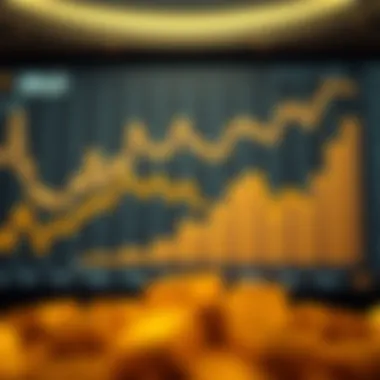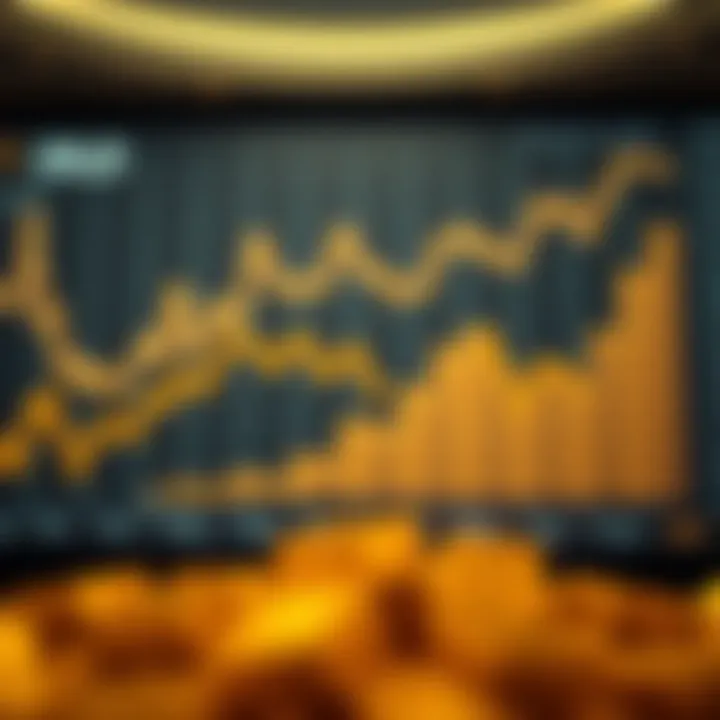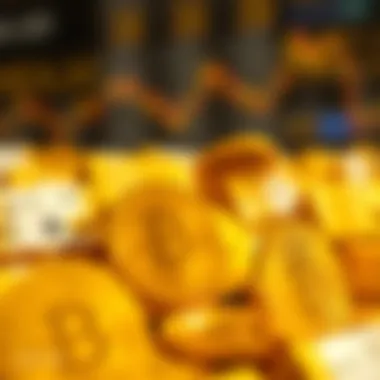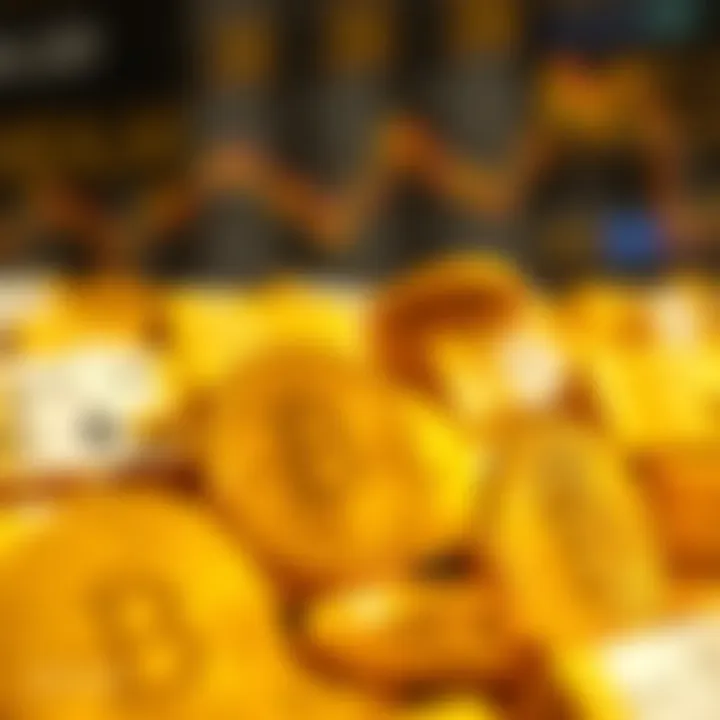Market Dynamics of 22-Carat Gold in Dubai


Intro
The market for 22-carat gold in Dubai provides a unique lens through which various economic factors can be examined. This segment of the market stands not just as a measure of wealth, but as a barometer of broader economic conditions, both locally and globally. In a city renowned for its opulence and trade, the fluctuation in gold prices holds significance for investors, expatriates, and consumers alike.
From the bustling Gold Souk to high-end jewelry stores scattered throughout Dubai, the allure of gold transcends mere aesthetics; it embodies a complex interplay of cultural significance and economic strategy. Understanding these dynamics is crucial for anyone looking to either invest or partake in the local economy.
As we navigate through the intricate elements that influence these prices, we will uncover how changes in currency, shifts in global demand, and economic policies shape the relationship between gold and real estate in this vibrant metropolis.
In the sections that follow, we will delve into current trends, future projections, and lifestyle considerations, offering insights that empower informed decision-making.
Current Trends in 22-Carat Gold Prices in Dubai
Understanding the current trends in 22-carat gold prices in Dubai is crucial for anyone involved in the gold market, whether they are investors, agents, or expatriates. This section will unpack the nuances behind the recent moves in prices, explaining how they can be influenced by a myriad of factors. The price of gold is not just a number; it reflects consumer sentiment, economic health, and geopolitical stability.
Historical Price Movements
To appreciate the present, we must first glance at the past. Over the last decade, 22-carat gold prices have experienced notable fluctuations. For example, just five years ago, prices were significantly lower during periods of economic stability, hovering around 1300 AED per ounce. However, recent global events, such as trade disputes or shifts in oil prices, have sent the markets into a tailspin, often raising gold prices as investors flock to what is considered a safe haven.
In Dubai, historical price movements are not merely influenced by global trends but are also reflective of local market conditions. For instance, the local demand for gold during festive seasons, like Eid or weddings, can dramatically spike prices due to increased consumer purchases, creating a fascinating interplay between cultural traditions and market dynamics. Understanding these historical patterns helps in navigating future trends and forecasting potential price movements.
Daily Fluctuations and Price Tracking
Daily fluctuations in 22-carat gold prices can be as unpredictable as a cat on a hot tin roof. Various factors contribute to these swings, including local trading activities, international market pressures, and changes in investor behavior. For someone actively involved in the market, tracking these daily price shifts isn't just useful—it's essential.
Investors can utilize several online platforms and apps designed for price tracking, often seeing updates every few minutes. Traditionally, shops in the gold souks, renowned for their competitive environments, also display real-time prices. Being alert with current values allows both buyers and sellers to make informed decisions. As a note, the Dubai Gold & Commodities Exchange (DGCX) often serves as a bellwether for traders and serious investors in assessing market trends.
Factors Influencing Gold Prices
Understanding the factors influencing gold prices is crucial for any stakeholder in the Dubai market. Gold is more than a shiny metal; it holds cultural significance, acts as a hedge against inflation, and reflects economic stability. In Dubai, where gold trading is not just a business but a part of the lifestyle, recognizing these influences is vital for making informed decisions. Each factor has its own weight, revealing how interconnected and sensitive the market is to global and local changes.
Global Economic Indicators
Global economic indicators play a pivotal role when it comes to gold prices. These indicators include figures such as GDP growth rate, employment numbers, and inflation rates, which are available from various sources including the International Monetary Fund and World Bank. For instance, when inflation rises in key economies like the USA or the Eurozone, investors often flock to gold as a safety net, driving up prices. Moreover, geopolitical tensions can lead to increased demand for gold as a safe haven. To illustrate, during times of conflict or uncertainty, the price of 22-carat gold often sees an uptick as global investors seek refuge from volatile equities.
Additionally, economic forecasts can influence investor behavior. Good economic news might discourage gold buying as confidence in currencies and stocks increases. Conversely, poor economic data could trigger a surge in gold purchases. Thus, staying updated on global economic trends gives investors a clearer picture of what to expect in gold pricing.
Local Demand and Supply Dynamics
In Dubai, the local demand and supply dynamics add another layer to the gold pricing puzzle. The city is known as a trading hub for gold, attracting both local buyers and expatriates. During festive seasons or special occasions, such as weddings or Eid celebrations, the demand for 22-carat gold escalates significantly. The surge in demand during these times can drive prices higher, even independently of global trends.
Conversely, the supply of gold can fluctuate based on factors such as mining productivity, political stability in gold-producing countries, and even the smuggling of gold, which sometimes disrupts the usual flow of goods into Dubai’s markets. Moreover, the supply chain for gold can be lengthy, and any disruption may have immediate price implications. Assessing local market conditions, including the balance between buyers and sellers, is essential for understanding price movements in Dubai.
Impact of Currency Exchange Rates
Currency exchange rates exert a noticeable influence on gold prices in Dubai, primarily because gold is traded internationally in U.S. dollars. A stronger dollar typically correlates with lower gold prices, while a weaker dollar often means higher prices. For investors based in Dubai, fluctuations in the exchange rate can alter the cost of gold significantly. If the UAE dirham strengthens against the dollar, local buyers could find gold cheaper, potentially driving up demand.
Furthermore, expatriates sending money back home often buy gold as gifts, adding another layer to price determination. Currency fluctuations can make it either more attractive or less favorable to buy gold, affecting market dynamics almost instantly. Thus, keeping an eye on forex rates and their movement is vital for anyone looking to navigate the Dubai gold market successfully.
Understanding the factors influencing gold prices in Dubai allows buyers and sellers to make informed choices about their investments.
In summary, gold prices are not merely numbers but are rather a reflection of various intertwined global and local influences. Whether you are an investor, a buyer, or just curious about the market, grasping these factors is essential for navigating the complexities of gold trading in Dubai.
Buying and Selling 22-Carat Gold in Dubai
The act of buying and selling 22-carat gold in Dubai is woven into the very fabric of the city’s culture and economy. This topic is essential for anyone looking to navigate the gold market effectively. Understanding the intricacies can yield significant benefits, whether one is a seasoned investor or a casual buyer. Knowing where to buy, how transactions unfold, and the nuances that come with this precious metal can help you make informed choices.


The importance of this subject goes beyond daily transactions. It influences long-term investments, aids in understanding market sentiment, and provides insights into the regional economy. The intrinsic value of gold resonates with many—both as a form of wealth and a cultural emblem.
Marketplaces and Retailers
In Dubai, the landscape for buying and selling 22-carat gold is as vibrant as the city itself. Various marketplaces exist, catering to different preferences and budgets. The most prominent among them is the Gold Souk, situated in the heart of Deira. This historical marketplace offers an extensive range of jewelry, all made from gold, and is where you can haggle for the best prices, an activity that's part and parcel of the experience.
In addition to the traditional souk, international retailers like Tiffany & Co., Malabar Gold and Diamonds, and Damas provide a more contemporary shopping experience. These stores not only offer quality assurance but also a diverse selection of designs, catering to modern taste.
The prices at these marketplaces vary depending on location, brand reputation, and craftsmanship. Therefore, doing your homework before buying is crucial. Checking the current gold price against the dealer's quote will help you gauge the deal's fairness.
Consumer Tips for Transactions
Navigating transactions in the 22-carat gold market requires some savvy. Here are practical tips to keep in mind:
- Research Current Prices: Always check current market rates for 22-carat gold before making any purchase. Websites like GoldPrice.org provide real-time updates on gold prices.
- Ask About Making Charges: When purchasing jewelry, it’s essential to ask about making charges. These can add a significant amount to the total cost. Understanding these will help you determine the actual value of what you're buying.
- Certification Matters: Ensure that the gold you buy comes with a certification from a recognized authority. This guarantees the purity of the product for both peace of mind and potential resale.
- Bargaining is Normal: In local marketplaces, do not shy away from negotiating the prices. Bargaining is expected in the souks, and you could save a fair chunk this way.
- Consider Seasonal Trends: Gold prices can fluctuate based on various seasons and events. For instance, during festive seasons like Eid or weddings, prices might spike due to increased demand.
"In the world of gold trading, knowledge is not just power—it's profit."
Whether you are planning to buy for personal use or investment, honing in on these details can lead to smarter purchases. In Dubai's dynamic gold market, being informed is your best asset.
Implications for Real Estate Investments
The fluctuations in 22-carat gold prices in Dubai hold significant implications for real estate investments. The close relationship between gold and property prices not only impacts investor decisions but also informs broader economic strategies across sectors. When gold prices rise, particularly in a market as dynamic as Dubai’s, it often signals increased wealth and consumer confidence. Hence, potential investors in real estate must monitor these gold price movements, as they provide critical insights into market trends and economic stability.
Correlation Between Gold and Real Estate Prices
Historically, there’s been a strong correlation between the prices of gold and real estate values. This can be attributed to several factors:
- Perceived Value: In the mind of the investor, both gold and real estate represent tangible assets that can act as safe havens during economic uncertainty. When gold prices increase, it often leads to higher valuations in the property market, as people feel financially secure and are more willing to invest.
- Inflation Hedge: As the cost of living rises, both gold and real estate stand as hedge against inflation. Investors tend to view these assets as reliable stores of value, leading to an uptrend in property investments when gold prices climb.
- Liquidity Effects: Investors often liquidate gold holdings to finance real estate purchases, especially in times of high gold valuations. This channeling of finance into real estate can cause an uptick in property prices, creating a feedback loop that benefits both markets.
In Dubai, this correlation is particularly evident. In recent years, as the global demand for gold surged, there was a noticeable increase in property prices. Investors may refer to this cycle to make informed decisions about buying or selling real estate in the UAE market.
Using Gold as an Investment Hedge
Investing in gold serves as an effective hedge against potential downturns in the real estate market. When property values plunge, the intrinsic value held in gold offers a buffer, mitigating risks tied to fluctuating real estate prices. Consider the following aspects of this strategy:
- Asset Diversification: By balancing investments between gold and real estate, individuals can reduce overall risk. Diversification into gold provides a safety net; if one asset class declines in value, the other may hold steady or even appreciate.
- Stability and Security: In times of political or economic unrest, gold tends to maintain its value better than real estate, which can be subject to market whims and local regulations. Investors in Dubai can benefit from having gold in their portfolio, especially considering the region's fluctuating market dynamics.
- Preservation of Wealth: Over the long haul, gold has been known to preserve wealth. When combined with real estate investments, it serves as a cushion against market volatility, ensuring that the investor retains purchasing power should unforeseen events impact property values.
In summary, the interplay between 22-carat gold prices and real estate investments in Dubai cannot be overstated. The correlation highlights not just a pattern of investments but also a strategic necessity for investors looking to navigate the complexities of both markets effectively.
To further explore these concepts, investors may refer to insights from trusted finance and market analysis websites, including Investopedia and Gold.org, which provide thorough research on gold as an investment vehicle alongside property dynamics.
Regulatory Environment in Dubai
Understanding the regulatory environment surrounding gold trading in Dubai is essential for anyone involved in this market. This section aims to unravel the key components that shape the import, sale, and purchase of 22-carat gold, providing a solid foundation for investors and consumers alike. The legal framework in place helps in ensuring a stable and transparent market, which is crucial for building confidence among buyers and sellers.
Import Duties and Taxes
First on the list of considerations are import duties and taxes, which play a significant role in determining gold prices in Dubai. The government imposes levies on imported gold, impacting the cost directly. As of now, Dubai has managed to position itself as a relatively favorable market for gold transactions, with a low import duty rate compared to other countries. This has catalyzed a more vibrant trading environment, driving both local and international buyers to engage in the market.
When contemplating the purchase of 22-carat gold, it is vital to acknowledge the following:
- Duty Structure: Dubai charges a standard import duty of 5% on gold from outside the Gulf Cooperation Council (GCC). Gold from GCC countries is exempt from this duty. Understanding this can help buyers strategize their purchases effectively.
- Value-Added Tax (VAT): A 5% VAT applies to gold goods. It becomes crucial to factor in this expense when calculating the overall cost of investment.
- Transparency: The clear tax structure is a boon for investors, making transactions more straightforward and reducing the risk of hidden fees or sudden increases in costs.
The implication of these duties on the overall pricing strategy cannot be overlooked. Despite the additional costs, Dubai's relatively lower rates often make it more attractive than larger markets, thereby fostering a competitive edge.
Compliance with Local Laws


Compliance with local laws is equally important and serves as the backbone of safe trading practices in Dubai's gold market. The UAE has strict regulations governing the trade of gold to prevent illegal activities such as money laundering and smuggling. For businesses and individuals involved, adhering to these laws is not just a legal obligation but a way to maintain the integrity of the market.
Key elements of compliance include:
- Licensing Requirements: All gold trading entities must be licensed by the Dubai Multi Commodities Centre (DMCC) or similar authorities. This certification affirms that businesses operate within the legal framework and comply with ethical practices.
- Record Keeping: Traders are obligated to maintain detailed records of all transactions. This level of transparency makes it harder for illicit activities to go unnoticed, consequently protecting genuine investors.
- Inspection Protocols: Authorities frequently conduct inspections to ensure that traders follow the rules. This creates a safeguard for consumers, fostering confidence in the gold they purchase.
"Understanding the legal landscape not only safeguards your investment but also upholds the reputation of the entire trade ecosystem in Dubai."
Future Projections for Gold Prices
Understanding the future projections for 22-carat gold prices in Dubai is crucial for investors and consumers alike. Gold, often viewed as a safe haven, reacts to a medley of global economic factors and local dynamics that create a climate of uncertainty or opportunity. When contemplating investments in gold, grasping potential future price trajectories can guide better decision making, whether one is planning for short-term trades or long-term holdings. Each prediction holds weight and considerations that must be taken into account, particularly in market environments that are subject to rapid fluctuations.
Expert Opinions and Predictions
There exists a spectrum of thought among financial analysts regarding the future of gold prices. Many financial experts believe that gold will continue to maintain its allure, especially during turbulent economic periods. For instance, market analysts like Peter Bauers and Jou Tran highlight key indicators such as inflation rates, geopolitical tensions, and shifts in central bank policies which could steer gold prices upward.
- Inflationary Pressures: With inflation rates on the rise in various parts of the world, gold's historical status as an inflation hedge remains pertinent. Experts often state that when currency values weaken, gold tends to hold its ground or even increase, providing a reliable store of value.
- Geopolitical Tensions: Events like trade wars or military conflicts invariably nudge investors towards gold. Analysts frequently remind the market that heightened global tensions can lead to demand surges, thereby affecting prices.
- Central Bank Policies: The actions of central banks can have profound impacts on gold pricing. For instance, if a major economy like the U.S. were to adopt looser monetary policies, we may witness an uptick in gold prices due to decreased confidence in fiat currencies.
From the insights of these seasoned professionals, it is clear that being attuned to economic indicators is fundamental for anyone looking to navigate the gold market effectively.
"Predicting gold prices is as much an art as it is a science, given the cultural and economic nuances in play" - Market Analyst
Potential Market Disruptions
The gold market, like many others, is not immune to disruptions that can shift the landscape unexpectedly. Investors must keep an ear to the ground for potential changes that could sway prices. Here are some of the disruptions to watch:
- Technological Advancements in Mining: Innovations can lead to lower costs and expanded supply from major mining companies. The introduction of advanced extraction techniques or automation can transform production efficiencies, possibly saturating the market and affecting prices negatively.
- Economic Reforms and Policy Changes: Changes in local regulations may alter gold trading dynamics. For instance, if Dubai were to amend its import/export duties on gold, it could either facilitate increased trade or impose constraints that could impact local prices.
- Global Pandemics: Unexpected global events, much like the COVID-19 pandemic, restructured financial markets. Emergency economic measures can influence demand for gold, while supply chains may also be put to the test, drastically altering price trajectories.
Cultural Significance of Gold in Dubai
In Dubai, gold is not merely a commodity; it embodies a profound cultural significance that intertwines with the local identity. The allure of 22-carat gold transcends its market value, reflecting a blend of tradition, wealth, and social standing. Its importance is evidenced by the presence of sprawling gold souks and the exuberance surrounding gold purchases during festive occasions.
Gold as a Status Symbol
Gold serves as a status symbol in Dubai, proudly displayed by many as a hallmark of financial success and prestige. The act of wearing gold jewelry is often equated with affluence and social stature. It is not unusual to see the residents adorn themselves in lavish gold pieces, showcasing intricate designs that also celebrate the region's artistic heritage.
- Investment and Gift-Giving: For many Emiratis and expats alike, acquiring gold is seen as an investment strategy. The enduring value of gold makes it a preferred choice for securing wealth. Additionally, gold jewelry is frequently gifted during marriages, birthdays, and religious observances, enhancing its status as a symbol of love and prosperity.
- Market Dynamics: The demand for gold jewelry contributes significantly to Dubai's economy, positioning the emirate as a leading hub for gold trading globally. The thriving market attracts buyers from all over, enhancing its reputation as the “City of Gold.”
Role in Traditional Celebrations
Gold jewelry plays a pivotal role in traditional celebrations throughout Dubai. The festive spirit during Eid al-Fitr and Eid al-Adha is often highlighted by the adornment of gold, with many planning their purchases well in advance to mark the occasion. Weddings are particularly significant; luxurious gold pieces are not only worn by brides but also exchanged between families, cementing relationships and showcasing regard.
In many respects, the significance of gold in these celebrations reflects a deep-seated cultural reverence that goes hand in hand with social customs. Here are some key aspects:
- Symbol of Blessings: In local traditions, wearing gold is considered a way to invite blessings. It is common for brides to be decked out in elaborate gold attire to symbolize abundance and happiness.
- Cultural Heritage: This ritualistic attachment to gold exemplifies the rich cultural heritage of the UAE, with designs often inspired by Arabic art and heritage.
"Gold is not just a material; it's a cherished piece of our history and an integral part of our identity in Dubai."
The cultural significance of 22-carat gold resonates clearly throughout Dubai, highlighting its multifaceted role in society as a symbol of wealth, love, and heritage. The legacy of gold as a status emblem and its celebration during traditional events only reinforces its importance amid shifting market dynamics.
Comparative Analysis with Other Markets
Price Comparisons with Major Global Markets
When compared to major global markets like London, New York, and Hong Kong, Dubai has its own set of nuances. The spot prices for gold can vary considerably between these locations due to several factors such as local demand, regulatory environments, and import duties.
- Dubai vs. London: The London Bullion Market is often regarded as the gold standard for pricing. Dubai, however, typically offers lower premiums on gold, making it a favored destination for bulk buyers. The elasticity of the market can sometimes offer surprising discounts, especially during seasonal demand fluctuations.
- Dubai vs. New York: The New York market functions on a more structured trading schedule compared to the UAE's 24/7 trading system. This continual access allows Dubai to react swiftly to global shifts, whether in bullion value or currency. Consequently, it's not uncommon to find prices in Dubai being slightly lower due to this agility.
- Dubai vs. Hong Kong: Similar to Dubai, Hong Kong serves as a gold hub, especially due to its low tax regime. However, with logistics and transport being more congested in Hong Kong, Dubai often edges out with quicker transaction times and more straightforward buying processes.


In essence, observing these price comparisons highlights that while Dubai may not always be the cheapest option, its other benefits—such as accessibility and lower transaction costs—cannot be dismissed.
Market Behavior in Emerging Economies
Beyond the immediate comparisons with heavyweight markets, the behavior of gold in emerging economies also warrants attention. Countries such as India and China, often seen as significant players in the gold space, provide insights into consumption trends that can affect prices globally.
- Consumer Demand in India: India's love for gold is deeply ingrained culturally; therefore, movements in gold prices in Dubai can often mirror shifts in Indian demand. A spike during wedding seasons or festivals in India, for example, typically mobilizes more buying in Dubai, continuously impacting prices locally.
- China's Market Influence: China is a massive consumer of gold, and fluctuations in its demand easily ripple through other markets, including Dubai. The growing wealth in urban areas fuels an insatiable desire for gold as a form of investment and status. This ongoing growth often stabilizes Dubai's gold prices, making them less susceptible to fleeting trends.
- Investment Trends in Africa: Several African nations are becoming players in the gold market as economies develop. Their purchasing influences from gold-rich nations, like Dubai, provide insights into future price trends. As these economies grow, so does their investment capacity, paving the way for increased competition for buying gold in Dubai.
This comparative study not only showcases how the Dubai gold market adapts but also complements global pricing strategies. By keeping an eye on emerging economies, investors can tap into future potentials and assess their long-term strategies.
"In the realm of gold investments, understanding market dynamics is just as precious as the gold itself."
The Role of Technology in Gold Trading
In today's rapidly evolving market, technology has reshaped the way gold is traded. Especially in places like Dubai, where the gold market is bustling, understanding the role of technology is essential for both investors and consumers. Technology not only streamlines the buying and selling process but also enhances transparency and security in transactions. This section will delve into how digital platforms and blockchain technology are intrinsically linked to the dynamics of 22-carat gold trading.
Digital Platforms for Buying and Selling
The emergence of digital platforms has revolutionized the gold trading landscape. Investors can now buy or sell their gold holdings with just a few clicks on their phones or computers. This accessibility is a game changer, particularly in a city like Dubai, where the gold market is highly competitive.
- Convenience: Users can check live prices, place orders, and receive instant confirmations from the comfort of their homes.
- Market Reach: Platforms like Dubai Gold & Commodities Exchange and various smartphone applications allow for broader participation from global investors, not just local buyers. This democratization of access means that anyone with an internet connection can participate in the gold market.
- Price Alerts and Analytics: Many platforms provide tools to set alerts when gold reaches a desired price. Analytics and forecasting features also guide investors in making informed decisions.
Digital platforms have become essential in connecting the dots between buyers and sellers, streamlining the entire process. They create an environment where market participants can engage in transactions that are not only swift but also efficient.
Blockchain and Its Impact on Gold Transactions
Blockchain is another technological innovation that has begun to carve out its niche in the gold market. Primarily recognized for its role in cryptocurrency, its applications in gold trading are increasingly significant. Here’s how:
- Transparency: Blockchain technology offers an immutable ledger that records every transaction. This ensures that the history of gold ownership is clear, reducing the risk of fraud—an essential factor in a market often scrutinized for its integrity.
- Traceability: Gold's journey from mine to market can be recorded on a blockchain. This means consumers can verify the source of their gold, ensuring it meets ethical and environmental standards, and thus providing them greater peace of mind.
- Smart Contracts: These are executed automatically when certain conditions are met, reducing the need for intermediaries. This could cut down on costs, making trading more appealing to both buyers and sellers. Imagine a scenario where an investment agreement is executed the minute gold prices rise to a predetermined level, without needing constant oversight from either party.
Blockchain technology not only ensures transparency and trust but also facilitates faster transaction times in the gold market.
In essence, the role of technology in gold trading is multifaceted. Investors can expect a market that is more accessible, transparent, and efficient than ever before. As Dubai continues to solidify its position as a global hub for gold trade, those adapting to these technological advancements will likely stand at the forefront of this evolving landscape.
Investor Behavior in the Gold Market
Understanding investor behavior in the gold market is crucial, especially in a vibrant hub like Dubai, where gold is not just a commodity but a hallmark of wealth and status. Investors range from newly minted enthusiasts to seasoned pros, each bringing their own perspectives, expectations, and strategies to the table. Through the lens of Dubai's unique marketplace, we can see how cultural, economic, and psychological factors shape the decisions made by these individuals.
The gold market, particularly 22-carat gold, serves as a reflection of broader economic conditions. As a tangible asset, gold often sees increased investment during times of uncertainty. Investors flock to it like moths to a flame when the financial winds start blowing chilly. Thus, recognizing the patterns in investor behavior can provide significant insights into price movements and market trends.
Risk Assessment and Management
Engaging with gold as an asset class necessitates a solid understanding of risk assessment and management. Investors must weigh various types of risks involved—market risk, liquidity risk, and geopolitical risk, just to name a few. Market risk arises from fluctuating prices caused by various factors, including shifts in demand or global economic changes. Investors should be vigilant, monitoring any movements in the price of gold regularly. It isn't just about purchasing at the right time; it's about knowing when might be best to sell as well.
Geopolitical risks can also play a pivotal role in this market. Events such as conflicts, policy changes, or economic sanctions can have far-reaching effects on gold prices. Investors need to be prepared for sudden changes and must strategize on how to react.
To effectively manage these risks, investors should consider the following:
- Conducting thorough research on market conditions.
- Keeping abreast of geopolitical events that could impact prices.
- Diversifying their portfolios to mitigate risk.
Being well-informed is half the battle. Engaging with financial advisors or utilizing analytical tools can further enhance one’s understanding and decision-making ability.
Long-term vs Short-term Investment Strategies
The choice between long-term and short-term investment strategies in the gold market is a common dilemma among investors. Long-term investors often view gold as a store of value, akin to a hedge against inflation or currency devaluation. For instance, when economic downturns loom, these investors tend to hold onto their gold, with the expectation that its value will appreciate over time. This strategy is typically characterized by less frequent trading, reflecting a patient mindset toward wealth accumulation.
On the flip side, short-term investors, also known as traders, capitalize on immediate price fluctuations. They often employ techniques like day trading or swing trading to maximize profits. However, this approach demands acute market awareness and quick decision-making. It’s not for the faint-hearted, as market volatility can be a double-edged sword, leading to swift gains or losses.
When deciding on a strategy, investors might consider factors such as:
- Their risk tolerance and financial goals.
- Their knowledge of market trends and economic indicators.
- The current state of the gold market in context to global events.
"Knowledge is the key to unlocking gold's potential."











